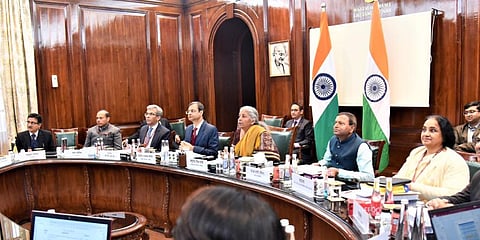

NEW DELHI: The GST Council on Saturday agreed to decriminalise certain offences and doubled the threshold for launching prosecution under the tax law to Rs 2 crore, but retained the limit at Rs 1 crore for fake invoicing.
The Council also clarified the definition of SUVs (sports utility vehicles) for the levy of a 22 per cent compensation cess and decided to come out with parameters to define MUVs (multi-utility vehicles).
Briefing reporters after the 48th GST Council meeting, Finance Minister Nirmala Sitharaman said the Council could decide on only 8 out of the 15 agenda items due to paucity of time, but added that no new taxes have been brought in.
The agenda items which could not be considered included taxation for pan masala and gutkha firms and a report by a Group of Ministers (GoM) on setting up of appellate tribunals.
The report of another GoM, chaired by Meghalaya Chief Minister Conrad Sangma, on GST levy on online gaming, casinos and horse racing was also not part of the agenda for Saturday's meeting.
Sitharaman said in the case of SUVs, the clarification that has been given is that the higher rate of compensation cess of 22 per cent is applicable to a motor vehicle fulfilling all four conditions -- it is popularly known as SUV; has engine capacity exceeding 1,500cc; length exceeding 4,000 mm; has a ground clearance of 170 mm and above.
"So this clarification is not a new tax, it's more to say what defines that commodity which is under taxation as SUV," the minister said.
Sitharaman said the discussion on MUVs began when some states asked whether sedans should be included in the SUV category. The states also suggested bringing in a definition for MUVs.
The minister said the Council decided that if any other motor vehicle categories need to be added to the 22 per cent cess, the panel of central and state tax officers (or the Fitment Committee) will look into it.
The Centre and states would attempt to widen the GST base at every level to increase the tax mop-up which is averaging about Rs 1.4 lakh crore every month. "So the focus will be on how much all of us are putting effort...to widen the tax base," she said.
Currently, 1.40 crore taxpayers are registered under GST.
Revenue Secretary Sanjay Malhotra said the Council took a "path-breaking decision" with regard to decriminalising three types of GST offences -- obstruction or preventing any officer in the discharge of his duties; deliberate tampering of material evidence; and failure to supply information.
The minimum threshold of tax amount for launching prosecution under GST has been raised from Rs 1 crore to Rs 2 crore, except for the offence of issuance of invoices without the supply of goods or services or both.
Also, the compounding amount has been reduced to the range of 25 to 100 per cent, from the present 50 to 150 per cent of the tax amount.
Central Board of Indirect Taxes and Customs (CBIC) Chairman Vivek Johri said currently under the GST law offences exceeding Rs 1 crore are considered for criminal prosecution.
"What was proposed in Council and what came out of the discussion was that the limit would be enhanced from Rs 1 crore to Rs 2 crore now. So cases involving tax amounts of up to Rs 2 crore will go out of the purview of criminal action, except cases of fake invoicing," Johri said.
He said the current threshold of Rs 1 crore for launching criminal prosecution will continue in fake invoicing cases which continue despite many measures taken by the tax authorities.
The Centre had in September issued directions to Central GST officers to launch prosecution in offences exceeding Rs 5 crore. That direction was given through a circular, but the GST law currently sets the limit at Rs 1 crore.
Malhotra said the amendments in GST law to give effect to the Council's decision on decriminalisation of GST offences would be brought in the Finance Bill, 2023.
After that, the state legislatures too would have to pass the amendments and pave the way for making the changes effective.
The GST Council also decided to lower tax rates on the husk of pulses to nil from 5 per cent.
Tax on ethyl alcohol supplied to refineries for blending with motor spirit (petrol) was reduced to 5 per cent, from 18 per cent.
These changes in GST rates were aimed at the "facilitation of trade and measures for streamlining compliances in GST," as per an official statement.
The Council also clarified that Rab (a type of jaggery) and fryums manufactured using the process of extrusion attract 18 per cent GST.